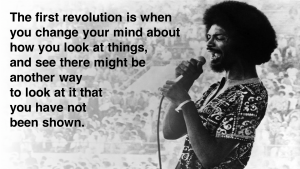As a child I was encouraged to reach for the stars. I was told that, whatever I wanted to achieve was attainable with hard work and diligence. As my journey in life continues I gain a greater understand of what my parents and teachers were trying to express to me. As I look at the opportunities that are available to African Americans today, I wonder if what my parents and teachers were trying to encourage me to do was even possible. I do believe based on ability and intellect my parents and teachers were well within their rights to instruct me to strive for greatness. But as I view the world from a different perspective, I wonder if certain opportunities were even unattainable, especially after I take into consideration my socioeconomic status. Like many other individuals from urban communities, I probably lacked the range, financial muscle, and social awareness it would have taken to become an astronaut or a petroleum engineer. In hindsight I was merely one of the millions of kids growing up in urban environments that only identified next level opportunity through professional sports, music, or performing. This section begins by taking a look at how we can broaden our range starting with career choices, as we work to educate our communities positioning through healthy options as we work to achieve Black Economic Empowerment.
Careers
Studies show that African Americans tend to gravitate to careers that derive from the social sciences. It seems that, of the few studies that have focused on the career decision-making process of African Americans, most have been concerned with perception of career-decision barriers (Brown, 1995). This seems to be ironic, due to the fact that as mentioned in the previous section, employment equality remains an issue in urban communities. Outside of the fact that the urban median is considerable lower than other communities, we see that our career choices began to play a major role as inner cities communities work to achieve socio economic mobility. Could it be that urban communities feel the racial divide early in life, therefore we tend to gravitate to career lanes that prove to have less obstruction. We all know that working through the social sciences is great work that embodies the power of community elevation, but what about these other occupations that have very little minority representation. What if we were exposed to those careers, as inner city children? Would that change the financial narrative that continues to keep our urban communities in limbo?
The graph below displays the various majors that are available to students entering their undergraduate studies. Notice the highest earning major for African Americans is Pharmacy, Pharmaceutical Sciences and Administration verses the lowest which would be Philosophy and Religious Studies. Now look, the major that African Americans are getting the majority of their degrees in is Health and Medical Administration Services, followed closely by Human Services and Community Organizations, and then Social Work. As we take another look at what majors produce the most financial stability, through the lifespan of ones career, we see Industrial and Manufactural Engineering, Chemical Engineering, and Electrical Engineering are runner ups to Pharmacy, Pharmaceutical Sciences and Administration. My questions is, “what does this graph say, if anything, about the climate, in regard to job opportunities for African Americans with undergraduate degrees?”
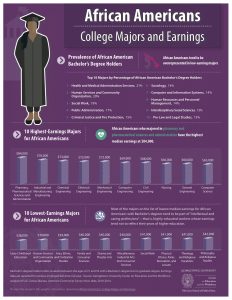
Center on Education and the Workforce: Georgetown University. jpeg. September 2, 2018
First of all it’s obvious that many of us have not been exposed to people in our communities with careers in engineering and pharmaceuticals. It’s also obvious that many of us have been exposed to people in our communities with careers in medical, non-profit, and social work. With that being said, there is a possibility of exposing more of the urban community high school students in fields that provide more financial median during the span of his/her career, which change the median dynamic in our neighborhoods. At this point we are talking about a difference of $20,000 dollars or more per year, which would definitely contribute to African Americans gaining socioeconomic mobility for Black Economic Empowerment. CEW Director Anthony Carnevale stated, “African-Americans are underrepresented in the top-earning fields of study, over-represented on the low end and tend to earn the least amount of money over the course of a career as a result.” With this information in mind it we have to take in to consideration why this narrative continues to play in urban communities as apart of American culture. Once again we end up grappling with a vicious cycle, in which many the students in these communities see the relevance in acquiring academia degrees, but lack diversity when it comes attaining pertinent information, which leaves them at the lower end of the socioeconomic totem pole.
As I continued to explore African American career choices, I decided to have a conversation with long time family friend Dr. Iris Grattan. Dr. Grattan, a board-certified naturopathic physician, recalls what it was like as an undergraduate student at Spelman College, and the transitions she had to make to pursue her goals in medical school. She admits that as she entered medical school, she felt that information, competition, and acceptance were issues that her and her classmates encountered on a daily basis. When I spoke to Dr. Grattan about the opportunity she has to build her private practice, she spoke about culture, marketing, and connecting to the people. She also feels that it’s important for students (especially from urban communities) to leave their comfort zone, do some traveling before they declare a major. We spoke about how travel and extending resources should provide diversity when it comes to choosing career goals, which in turn produces minorities with advanced options when working for socio economic mobility. Although Dr. Grattan has found success through her unique journey, when we spoke about finances and time consumption, she admits that if she was really aware of her own talents, and abilities as a young adult, she would have probably taken another route, or reflected more on a wider array of career options. We both agreed that the academic world is important to our inner cities communities, but traditional education may not be required to achieve socio economic mobility for Black Economic Empowerment.
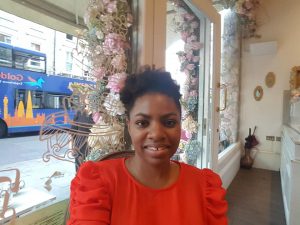
Grattan, Iris. “Doctor/Iris on location.” 2018. jpeg
Dr. Iris Grattan
This is short interview I had with Dr. Grattan over lunch in Harlem. We took a deeper look at formal and community education and the role that they both play in career choices and urban augmentation.
My time with Dr. Grattan help me to confirm how important opportunity has become in our communities. From Michael Jackson to Barack Obama it all started with an opportunity. This project about Back Economic Empowerment is rooted in education through community development by embracing opportunity strategically. Everyday we meet in community centers, churches, or local businesses, our objective should be to share information for the enhancement of urban opportunity. The desire to strive for greatness, through urban resources should never be taken for granted, this is the reason this website, and other forms of communication like it should exist, to reach out to urban communities for daily engagement, as well as food for thought.
After we create more opportunities for education through career diversity and resources in our urban communities, we have to begin to look at ownership. The fact that many of the people in our communities don’t own property or businesses is astonishing. Dr. Claude Anderson created the concept of Powernomics, in which urban communities merge resources and power to produce, dispense and consume goods and wealth in a way that is conducive to inner growth in urban communities. Anderson also believes that many people in these urban communities lack the means to compete for what has been promoted as the American Dream. Which goes back to my opening thought about my parents encouraging me to work my hardest to achieve my goals, but due to finances and resources some things were simple unattainable. Therefore, Dr. Anderson is simply stating that as we find our purpose and begin to apply ourselves, we also need the proper tools and training to achieve our goals.
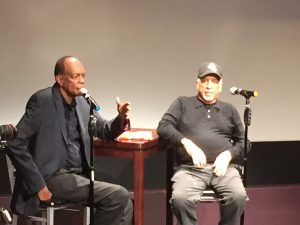
Bob Law & Dr. Claude Anderson
Madam C.J. Walker stated, “I had to make my own living and my own opportunity. But I made it! Don’t sit down and wait for the opportunities to come. Get up and make them.”
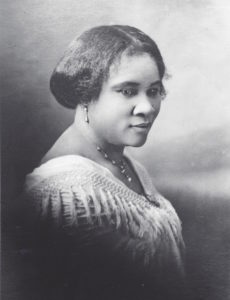
Madam Walker: Marketplace. jpeg. March 28, 2016
As the first black women recorded as a millionaire, her mindset and approach to life had to be aligned with hard work and resilience, especially in the late 1800’s. I wonder if our inner cities have lost the desire to see beyond the immediate, to reach for the stars. I think it’s still there, but to reach these goals we need guidance and direction through education about our communities. I included these circle charts below to analyze the meaning of urban economics and to examine what it will take to achieve socioeconomic mobility in our communities.
Earning Assets. The term “earning assets” refers to any assets which yield interest, dividends or other returns without significant effort on their owner’s part. Money invested in a business, held in an interest–bearing bank account or invested in stocks, bonds or medium term notes are examples of earning assets. (Figure 4)
Figure 4
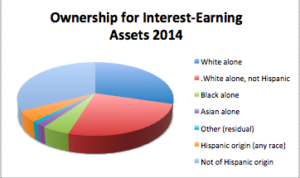
The Market Value of Debt refers to the market price investors would be willing to buy a company’s debt at, which differs from the book value on the balance sheet. It looks at the entire market value rather than just the equity value, so all ownership interests and asset claims from both debt and equity are included (Figure 5).
Figure 5
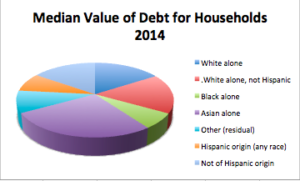
Both of these graphs indicate that minorities, which usually make up the demographics in urban communities, would really benefit from an increase in resources and a better understanding of finance in regard to American Culture.
Source: These data on income, earnings, income inequality & poverty in the United States based on information collected in the 2014 and earlier CPS ASEC.
Hip Hop
Since the official birth of Hip Hop in 1973, this music has taken the world by storm. From clubs in Manhattan to Nigeria we feel Hip Hop, as people recite lyrics, bounce to the beats, and ultimately stream their favorite songs. Ultimately Hip Hop has become a global phenomenon, it continues to provide innovative ways for us to identify with people all over the world. That’s why when I heard about a program called #HipHopEd I became intrigued about the potential to use the music as a way to identify some of the opportunities that might be available to young people from our urban communities. This process of teaching and learning could not only prove to be therapeutic but could also provide insight for careers paths that were not accessible to young people in urban communities 20 years ago.
The amazing thing about #HipHopEd is it begin on Twitter, and remains an active way to connect with the movement from 9-10 PM on Tuesday nights. This forum offers a weekly opportunity for hip hop enthusiast to share their thoughts and opinions about the state of urban culture. This is an example of how social media can be used to enlighten, as well as provide food for thought, to those who may not be able connect to resources in their immediate community for information in regard to establishing career objectives. Once again I believe that as we look to provide new opportunities and objectives for people in our urban communities, digital platforms hold the potential to reach audiences that would otherwise be unreachable.
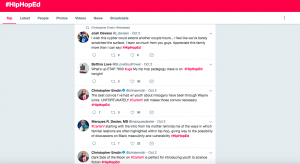
Emdin, Christopher. “@chrisemdin” October 2, 2018.
Emdin, Christopher. The Big Idea: HipHop Ed/Science Genius. June 18, 2012.
“Academia is racist, you would think that getting a high level of education would help you to escape some of the nonsense that we experience in the workplace. You’ll find that academia is a lot like the prison system in that there is not a lot of oversight there. The problems that exist in the arena can go unchecked for decades. I didn’t want to be a part of that.” -Dr. Boyce Watkins
As a graduate student the opportunity to work at a different capacity in life really intrigued me. Especially the ability to write and create ideas that might offer light or understanding in regard to the struggle that many people in urban communities face on a daily basis. The statement above made by Dr. Boyce Watkins, formally a finance professor at Syracuse University, is not shocking to me because I think certain aspects of racism in my mind are just people being people, I kinda figured along the way that if we are to succeed at any level, you have to work around some form of discrimination. I guess the part of Dr. Watkins voice and career that stand out the most to me is that after he resigned from Syracuse University, he decided to bring his principles of entrepreneurship to the world through lectures and social media. I guess the moral of this story is with education, belief in yourself, and discipline your goals are attainable.
“I’m ending the opportunity section of this website with a piece that I wrote called, ‘Justice & Peace.’ As poem translated through rythum and melody my expression of how a generation of people can labor for all the right things, yet still come up with the short end of the stick is blatant. This piece reeks from issues that have traumatized our urban communities, yet were told to walk it off or act like nothing ever happened. But they don’t know what they doing, they could hardly understand, that they’re only arresting, pieces of a man (Scott-Heron, 1971). I included this piece to demonstrate the power of healing through words and melodies. I truly believe that until you take time to heal, moving on remains an obstacle that will ultimately become an issue, which will continue to affect the way you deal with failure as well as success.” – Jeffrey C. Suttles
Justice & Peace
The way to get to know yourself
Is by the expression on other people’s faces
Because that’s the one thing you can see
Unless you carry a mirror about
If you aren’t having fun die
Because your running a worthless program
As far as I’m concerned
I’m honestly sure that I’m capable of love
And I’m sure of why
You should be able to do anything that you can afford
As an Adult
I don’t mind being criticized
I enjoy being criticized
Not by rumor tho
THE REVOLUTION WILL NOT BE TELEVISED
I’m telling you
I was a poet, now I’m a piano player!
(Repeat)
Gil Scott Heron. 2017. Recovery Network: Toronto. jpeg. October 2, 2018
